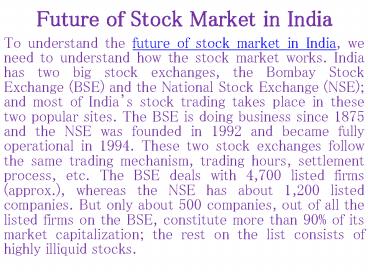Trading Companies in India - PowerPoint PPT Presentation
Title:
Trading Companies in India
Description:
To understand the future of stock market in India (manishhathiramani.com), we need to understand how the stock market works. India has two big stock exchanges, the Bombay Stock Exchange (BSE) and the National Stock Exchange (NSE); and most of India’s stock trading takes place in these two popular sites. The BSE is doing business since 1875 and the NSE was founded in 1992 and became fully operational in 1994. Trading companies in India do business by registering with both exchanges. All orders in the trading system need to be placed through brokers, who may provide online trading facility to retail customers. Proprietary trading companies in India can also take advantage of the direct market access (DMA) option, in which they use trading terminals provided by brokers for placing orders directly into the stock market trading system. – PowerPoint PPT presentation
Number of Views:31
Title: Trading Companies in India
1
Future of Stock Market in India
- To understand the future of stock market in
India, we need to understand how the stock market
works. India has two big stock exchanges, the
Bombay Stock Exchange (BSE) and the National
Stock Exchange (NSE) and most of Indias stock
trading takes place in these two popular sites.
The BSE is doing business since 1875 and the NSE
was founded in 1992 and became fully operational
in 1994. These two stock exchanges follow the
same trading mechanism, trading hours, settlement
process, etc. The BSE deals with 4,700 listed
firms (approx.), whereas the NSE has about 1,200
listed companies. But only about 500 companies,
out of all the listed firms on the BSE,
constitute more than 90 of its market
capitalization the rest on the list consists of
highly illiquid stocks.
2
Proprietary Trading
- Trading Mechanism
- The open electronic limit order book is used by
both exchanges to trade through. The order
matching is done by the trading computer. No
market makers or specialists are needed to match
orders and the entire process is order-driven,
which means that market orders placed by
investors are automatically matched with the best
limit orders. This facilitates privacy and
security of both parties as buyers and sellers
remain anonymous. This practice brings more
transparency, by displaying all buy and sell
orders in the trading system. However, in the
absence of market makers, there is no guarantee
that orders will be executed. Professionals
involved with proprietary trading plays a vital
role here.
3
Trading Companies in India
- Trading companies in India do business by
registering with both exchanges. All orders in
the trading system need to be placed through
brokers, who may provide online trading facility
to retail customers. Proprietary trading
companies in India can also take advantage of the
direct market access (DMA) option, in which they
use trading terminals provided by brokers for
placing orders directly into the stock market
trading system. The future of stock market in
India is promising and will surely bring more
security to investors.































